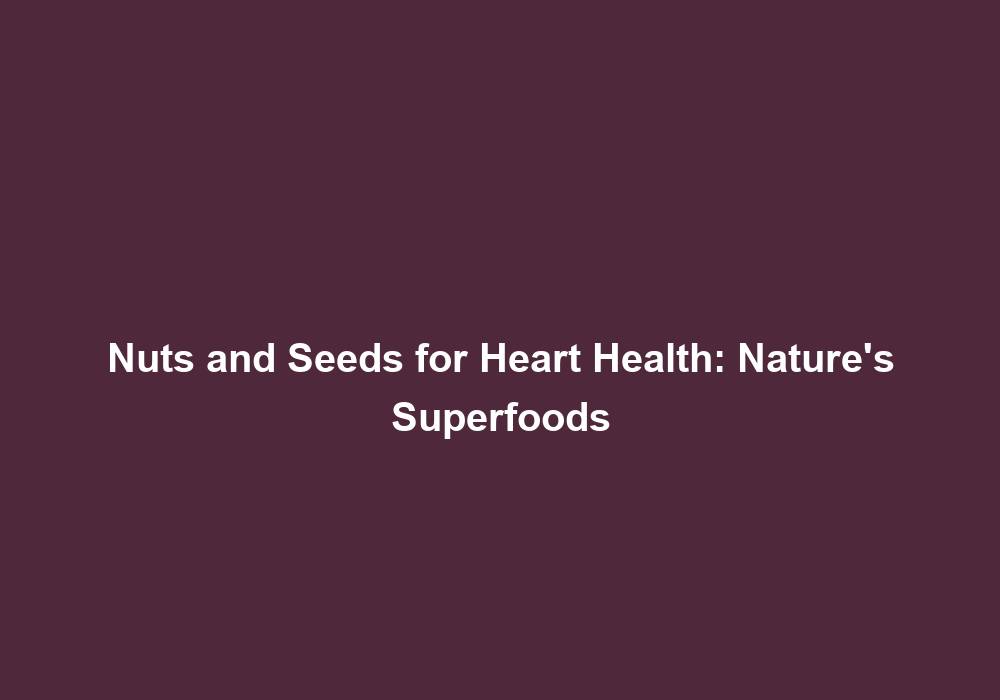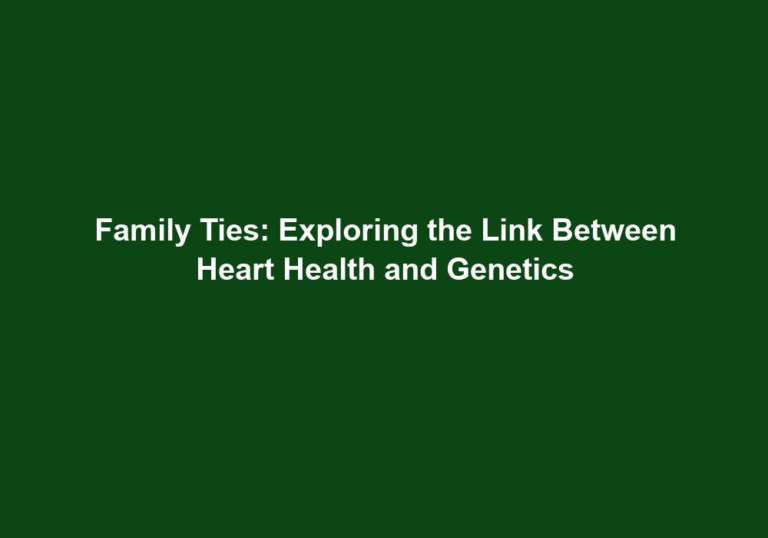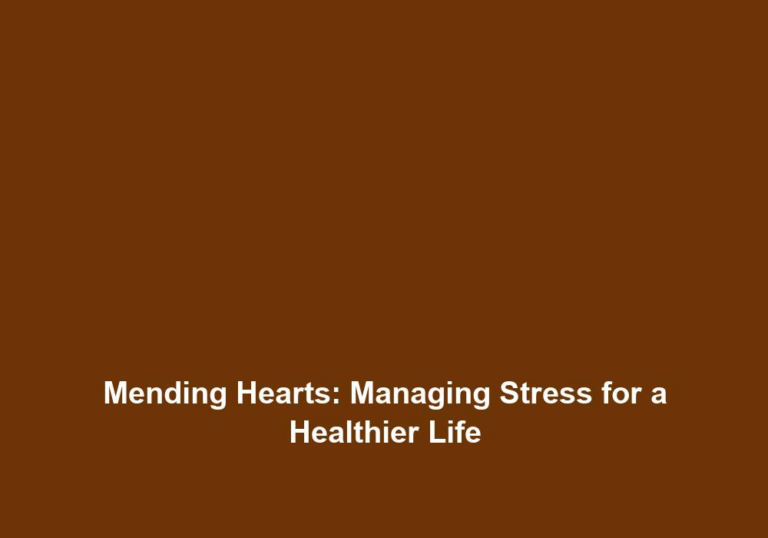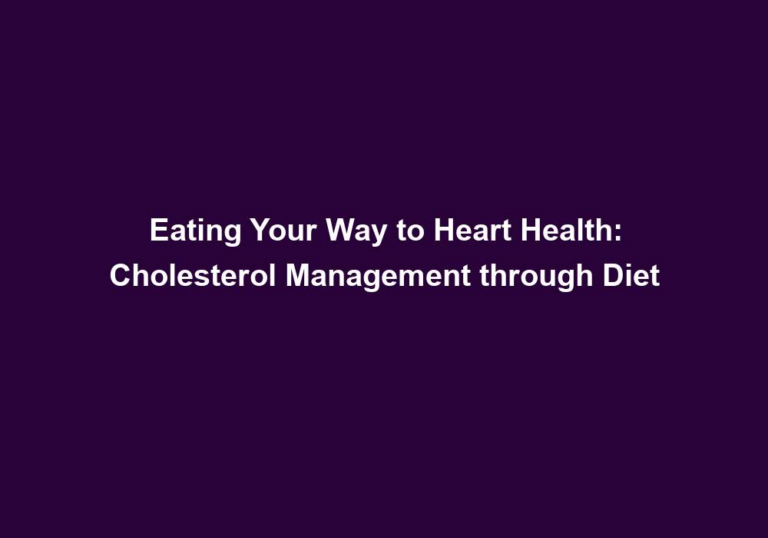Nuts and Seeds for Heart Health: Nature’s Superfoods
In today’s fast-paced world, maintaining a healthy lifestyle has become increasingly important, especially when it comes to heart health. Diet plays a crucial role in maintaining a healthy heart, and incorporating nuts and seeds into your daily routine can be a delicious and effective way to support cardiovascular well-being. These tiny powerhouses are packed with essential nutrients, healthy fats, and antioxidants, making them nature’s superfoods for heart health.
The Benefits of Nuts and Seeds
Including nuts and seeds in your diet offers numerous benefits when it comes to heart health. Let’s take a closer look at some of the remarkable qualities that make them an excellent addition to any heart-healthy diet:
1. Rich in Healthy Fats
Nuts and seeds are abundant in healthy fats, particularly monounsaturated and polyunsaturated fats. These fats are known to promote heart health by reducing bad cholesterol levels (LDL) and increasing good cholesterol levels (HDL). By incorporating nuts and seeds into your diet, you can improve lipid profiles, decrease inflammation, and lower the risk of heart disease.
- Monounsaturated and polyunsaturated fats in nuts and seeds have been shown to have a positive impact on heart health.
- These fats can help lower LDL cholesterol levels, which are known as the “bad” cholesterol, reducing the risk of plaque buildup in the arteries.
- Increasing HDL cholesterol levels, known as the “good” cholesterol, can further protect against heart disease.
- Consuming a variety of nuts and seeds can provide a range of healthy fats, such as omega-3 fatty acids found in walnuts and flaxseeds, which have additional heart-protective properties.
2. Excellent Source of Plant Protein
Nuts and seeds are not only packed with healthy fats but also provide a good source of plant-based protein. Protein is vital for overall health, and consuming a variety of nuts and seeds can help meet your daily protein requirements. These plant proteins are low in saturated fats, making them a heart-healthy alternative to animal protein sources.
- Protein is essential for the repair and maintenance of tissues, including the heart muscle.
- Plant-based proteins found in nuts and seeds offer a wide range of essential amino acids necessary for optimal health.
- Unlike animal protein sources, nuts and seeds are low in saturated fats, which can help reduce the risk of heart disease.
- Incorporating a variety of nuts and seeds into your diet ensures that you receive a diverse range of protein sources, promoting overall heart health.
3. Abundance of Antioxidants
Antioxidants play a pivotal role in protecting our body against oxidative stress and inflammation, both of which are associated with heart disease. Nuts and seeds contain a wide range of antioxidants, including vitamin E, flavonoids, and phenolic compounds. These antioxidants help neutralize free radicals and reduce the risk of developing heart-related conditions.
- Vitamin E, found in nuts and seeds, acts as a powerful antioxidant that helps protect against the damage caused by free radicals.
- Flavonoids and phenolic compounds found in nuts and seeds have anti-inflammatory properties that can reduce the risk of heart disease.
- Antioxidants in nuts and seeds can help reduce the oxidation of LDL cholesterol, preventing the formation of plaque in the arteries and reducing the risk of heart disease.
- Including a variety of nuts and seeds in your diet ensures a diverse intake of antioxidants, providing maximum heart-protective benefits.
4. High in Fiber
Fiber is essential for maintaining a healthy digestive system and promoting heart health. Nuts and seeds are an excellent source of dietary fiber, which aids in reducing cholesterol levels, regulating blood sugar levels, and promoting healthy weight management. By incorporating these fiber-rich foods into your diet, you can support heart health and improve overall well-being.
- Dietary fiber found in nuts and seeds helps lower LDL cholesterol levels, reducing the risk of heart disease.
- Fiber promotes healthy digestion by adding bulk to the stool and preventing constipation.
- Soluble fiber in nuts and seeds can help regulate blood sugar levels, reducing the risk of diabetes, which is a risk factor for heart disease.
- Including fiber-rich nuts and seeds in your diet can promote satiety, aiding in weight management and reducing the risk of obesity-related heart conditions.
5. Nutrient Powerhouses
Nuts and seeds are not only rich in healthy fats, protein, antioxidants, and fiber but also packed with essential vitamins and minerals. They contain an array of nutrients, including vitamin E, magnesium, potassium, calcium, and iron, all of which contribute to a healthy heart. Adding a variety of nuts and seeds to your diet ensures you receive a broad spectrum of essential nutrients necessary for optimal heart health.
- Vitamin E, present in nuts and seeds, acts as an antioxidant and helps protect the cells of the heart and blood vessels from damage.
- Magnesium and potassium found in nuts and seeds play a crucial role in maintaining normal heart rhythm and blood pressure.
- Calcium is necessary for proper muscle contraction, including the heart muscle.
- Iron is essential for the production of healthy red blood cells, which transport oxygen to the heart and other organs.
- Including a diverse range of nuts and seeds in your diet ensures that you receive a wide array of essential nutrients, supporting overall heart health.
Recommended Nuts and Seeds for Heart Health
Now that we understand the remarkable benefits of nuts and seeds, let’s explore some of the best options to include in your heart-healthy diet:
1. Almonds
Almonds are a nutritional powerhouse, rich in heart-healthy monounsaturated fats, fiber, and vitamin E. Incorporating a handful of almonds into your daily routine can help lower bad cholesterol levels, reduce inflammation, and support overall heart health.
- Almonds are an excellent source of monounsaturated fats, which have been shown to improve heart health by reducing LDL cholesterol levels.
- The fiber content in almonds can help regulate blood sugar levels and promote a healthy weight, both of which contribute to heart health.
- Vitamin E in almonds acts as an antioxidant, protecting against oxidative damage to the heart and blood vessels.
2. Walnuts
Walnuts are renowned for their high omega-3 fatty acid content, which provides numerous benefits for heart health. These healthy fats help reduce inflammation, lower blood pressure, and improve blood vessel function. Additionally, walnuts contain antioxidants and fiber, making them an excellent choice for heart-healthy snacking.
- Omega-3 fatty acids, particularly alpha-linolenic acid found in walnuts, have anti-inflammatory properties that can reduce the risk of heart disease.
- The fiber content in walnuts promotes healthy digestion and helps regulate cholesterol levels.
- Antioxidants in walnuts, such as vitamin E and polyphenols, contribute to heart health by reducing oxidative stress.
3. Flaxseeds
Flaxseeds are an exceptional source of alpha-linolenic acid, an omega-3 fatty acid that promotes heart health. Consuming flaxseeds regularly can help reduce blood pressure, lower cholesterol levels, and decrease the risk of developing heart disease. Remember to grind flaxseeds before consumption to enhance their digestibility and maximize nutrient absorption.
- Alpha-linolenic acid in flaxseeds has been shown to have beneficial effects on heart health, including reducing blood pressure and inflammation.
- The soluble fiber content in flaxseeds can help lower cholesterol levels, reducing the risk of heart disease.
- Grinding flaxseeds before consumption allows for better absorption of nutrients, including omega-3 fatty acids.
4. Chia Seeds
Chia seeds are rich in omega-3 fatty acids, fiber, and antioxidants, making them an excellent addition to a heart-healthy diet. These tiny seeds can help reduce inflammation, regulate blood sugar levels, and improve cholesterol profiles. Their gel-like consistency when soaked in liquid makes them a versatile ingredient in various recipes.
- Omega-3 fatty acids in chia seeds have been linked to a reduced risk of heart disease by lowering inflammation and improving cholesterol levels.
- The high fiber content in chia seeds promotes satiety, aids in weight management, and helps regulate blood sugar levels.
- Antioxidants in chia seeds, such as chlorogenic acid and caffeic acid, contribute to heart health by reducing oxidative stress.
5. Pumpkin Seeds
Pumpkin seeds are not only delicious but also packed with heart-healthy nutrients. They are an excellent source of magnesium, iron, zinc, and antioxidants. Incorporating pumpkin seeds into your diet can help lower blood pressure, support healthy cholesterol levels, and promote overall cardiovascular well-being.
- Magnesium in pumpkin seeds plays a vital role in maintaining normal heart rhythm and blood pressure.
- Iron and zinc found in pumpkin seeds are essential for the production of healthy red blood cells and immune function, respectively.
- Antioxidants in pumpkin seeds, such as vitamin E and carotenoids, protect against oxidative damage and promote heart health.
Delicious Ways to Incorporate Nuts and Seeds
Now that you are aware of the incredible benefits of nuts and seeds for heart health, here are some delicious ways to incorporate them into your daily routine:
- Enjoy a handful of mixed nuts as a convenient and heart-healthy snack. Choose unsalted varieties for a lower sodium intake.
- Sprinkle chia seeds or flaxseeds onto your morning yogurt, oatmeal, or smoothie bowl for an added nutritional boost.
- Add crushed almonds or walnuts to your salads, stir-fries, or baked goods for a delightful crunch and heart-healthy boost.
- Incorporate pumpkin seeds into your homemade granola or trail mix for a nutrient-dense and satisfying snack option.
Remember to consume nuts and seeds in moderation as they are calorie-dense. A handful or two per day is sufficient to reap the amazing benefits they offer for heart health.
In conclusion, nuts and seeds are nature’s superfoods when it comes to heart health. Packed with healthy fats, plant-based protein, antioxidants, fiber, and essential nutrients, they provide a diverse range of benefits, from reducing bad cholesterol levels to promoting overall cardiovascular well-being. By incorporating a variety of nuts and seeds into your daily diet, you can take a delicious and proactive approach towards maintaining a healthy heart for years to come.







